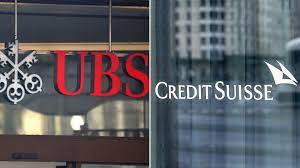U.S. stock futures rose on Sunday as the Swiss government engineered a forced takeover of Credit Suisse by UBS, marking the latest effort by governments around the world to stifle a crisis threatening the banking sector.
Dow Jones Industrial Average futures rose by 118 points, or 0.3%. S&P 500 futures and Nasdaq-100 futures climbed 0.3%.
Investors remained on edge as the week’s trading began, with regional banks still under pressure to shore up their deposit bases in the wake of the collapse of Silicon Valley Bank earlier this month. Wall Street expects more actions may be needed to restore confidence in the banking system after U.S. regulators backstopped SVB’s uninsured deposits and offered new funding for troubled banks one week ago.
The instability in the financial sector over the past two weeks raised the stakes for the Federal Reserve’s interest rate decision on Wednesday. As of Sunday evening, there is about a 62% chance of a quarter-point increase by the Fed, according to CME Group data using fed funds futures contracts as a guide. The other 38% is in the no-hike camp, anticipating that Chairman Jerome Powell may start to ease his aggressive tightening campaign that began in March 2022, in the face of the emerging financial contagion.
UBS agreed to buy Credit Suisse for 3 billion Swiss francs, or $3.2 billion, with the combined bank to have $5 trillion in assets. Credit Suisse shares were down 21% last week. Shortly after UBS announced its takeover deal, the Fed announced it had joined with other central banks in a joint liquidity operation. The group of central banks — including the Bank of Canada, Bank of England, Bank of Japan, European Central Bank and Swiss National Bank — agreed to increase the frequency of their U.S. dollar swap line arrangements from weekly to daily.
UBS’s takeover of its beleaguered rival is “unambiguously good for the overarching concerns about the stability of the global banking sector,” according to B. Riley Wealth Management’s Chief Market Strategist Art Hogan.
But traders may be anxious for more to be done by regulators to stem the slide in regional banks. First Republic shares ended last week 72% lower even after a group of banks Thursday pledged to deposit $30 billion in the San Francisco institution that’s become the focus on Wall Street. The SPDR Regional Banking ETF (KRE) tumbled 14% last week.
Despite the anxieties surrounding bank stocks, the S&P 500 and Nasdaq Composite closed higher for the week as investors rotated back into technology shares that could benefit from a lower interest rate environment. Meanwhile, the Dow declined 0.15% for the week.
“I think there’s there’s been an overreaction to the regional banks … And that likely represents an opportunity,” said Hogan.
“As we enter a new week, we will likely see a bid for both the big money center banks, and for the energy complex writ large, because I think there’s been a couple of severe overreactions in the marketplace,” Hogan added.
FDIC announces plans to sell Signature Bank assets to Flagstar Bank
In the US , FDIC announced a deal to sell “substantially all deposits and certain loan portfolios” of Signature Bank to Flagstar Bank, a subsidiary of New York Community Bancorp.
The agency said Signature’s 40 former branches will begin operating under Flagstar on Monday.
The agreement involves $38.4 billion of Signature’s assets, including $12.9 billion of loans the FDIC said were bought at a discount of $2.7 billion.
It said, however, Flagstar’s bid did not include the roughly $4 billion in deposits related to Signature’s digital banking business. The agency said it will provide those deposits directly to digital banking customers. The FDIC also said about $60 billion in loans will remain in receivership.
CNBC


Leave a Reply
You must be logged in to post a comment.